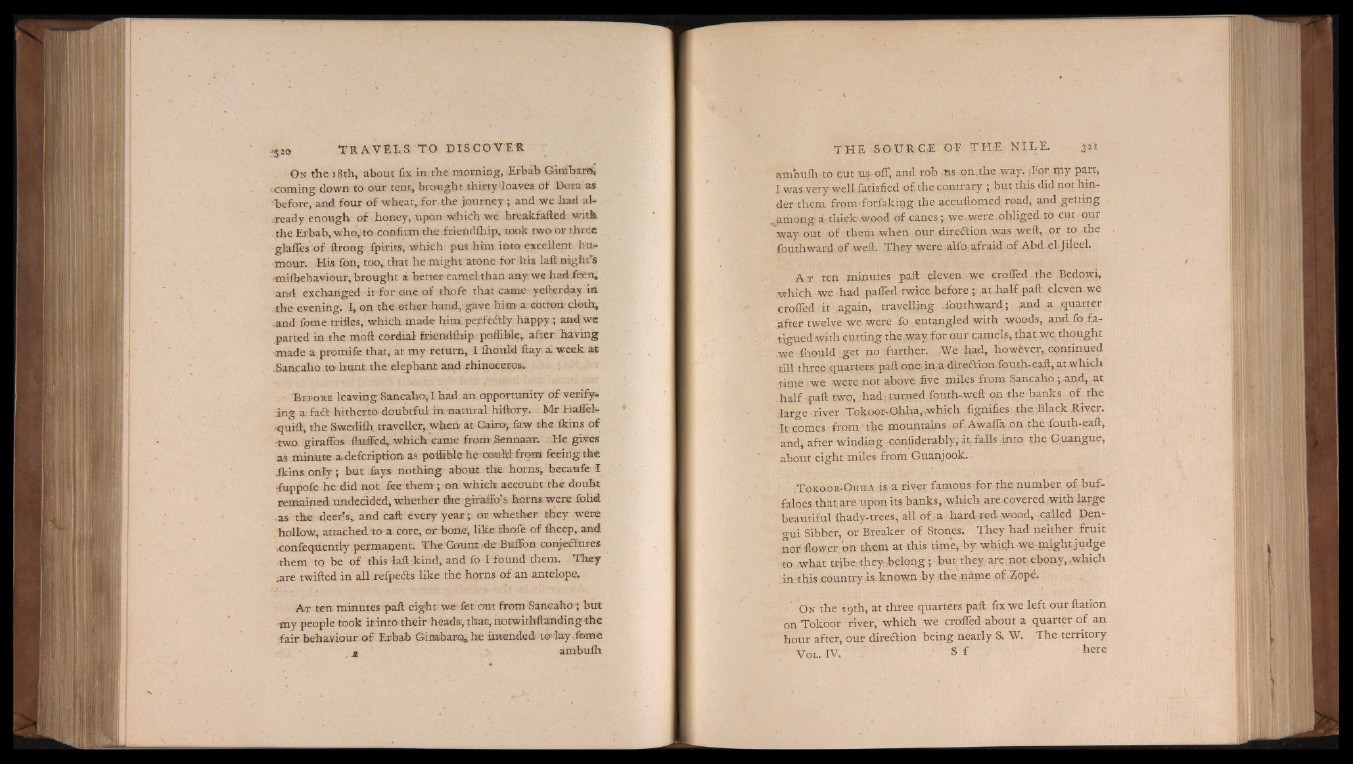
On the i &th, about fix in the morning, Erbab Gimbarei,
coming down to our tent, brought thirty'loaves o f Dora as
before, and four o f wheat,, for the journey ; and we had already
enough o f honey, upon w h ich we breaskfafted with
the Erbab, who, to confirm the friendihip, took two or three
glaffes o f ftrong fpirits, which put him into excellent humour.
His Ton, too,, that he might atone for hia laft night’s
mifbehaviour, brought a better camel than any we had feen,
and exchanged it for one o f thofe that came yefterday in
the evening. I, on the other hand, gave him a cotton cloth,
and feme trifles, which made him perfeftly happy ; and we
parted in the moft cordial friendihip poffible, after having
made a promife that, at my return, I fhbuld flay a w eek ait
.Saucaho to hunt the elephant and rhinoceros.
B e fo re leaving Sancaho, I had an opportunity o f v erify,
in g a fadf hitherto doubtful in natural hrftory. Mr Baffel-
quift, the Swedifli traveller, when at Cairo', fiiw the ikins o f
two giraffos fluffed,, w hich eamse from .Sennaar. He gives
as minute adefcription as poffible he could from feeing, the
ik in s o n ly ; but fays nothing about the horns, becaufe I
fuppofe he did not fee th em ; on. w h ich account the doubt
remained undecided, w hether the giraffe's horns were i b l i d
as the: deer’ s, and caft every y ea r; or whether they were
hollow, attached to a core, or bone, like thofe o f fheep, and
iConfequently permanent. The C au n tfle B r fo n conjeftures
them tq be o f this lafl.kind, and fo I found them. They
¿are twifted in all xefpefts like the horns o f an antelope.
A t ten minutes paft eight we fet out from Sancaho-; bu t
■my people took it into their heads, that, notwithftandingthe
■fair behaviour o f Erbab Ginjibaro, he intended' today fome
* ambulh
atnbuih to cut us off, and rob us on the way. iFor my part,
I w a s - very well-fatisfied o f the contrary ; but this did not hinder
them froui-forfaking the .accuftomed road, and g e ttin g
,_among a thfek wood o f canes; we were obliged to cut our
way out o f- them when our direction was weft, or to the
fouthward o f weft. They were alfo afraid, o f Abd.el-Jileel.
■At ten minutes paft eleven we croffed the Bedowi,
w hich we had paffed twice, before ; at h a lf paft eleven we
croffed it .again, travelling .fouthward ; ,and a quarter
after twelve we were fb entangled with woods, and. fo fatigued
with cutting the w a y for our camels, tjaat we thought
we fhould get no further. We had, however, continued
till three quarters paft one in a direftion fouth-eaft, at which
time \vc were not above -five miles from Sancaho; and, at
h a lf paft two, had turned foufch-weft on the banks o f the
large river -Tokoor-Ohha,.w h ich .fign-ifies the Black .River.
It comes from the mountains o f Awaffa on the fouth-eaft,
and, after winding confiderably; it- falls into the Guangue,
about eight miles from O u an jo ok..
T o k o o r - O h h a is a river famous for the number o f b u ffaloes
that are upon its banks, which.are covered with large
b e a u t i f u l fhady-trees, all o f ,-a hard red-wood, called Den-
g u i Sibber, or Breaker o f Stones. They had neither f ru it
noriflowcr ’on them at this time, by whic^-wpmigh t ju d g e
to w hat tribe they .belong ; but they, are not ebony, .which
in this country is known by th e name of-Zope.
On the 19th, at three quarters paft fix we left ourftation
on T o k o o r river, which we croffed about a quarter o f an
hour after, our direftion being nearly S. W. The territory
V ol. IV. ! S f here